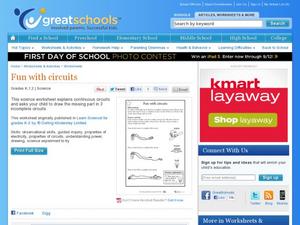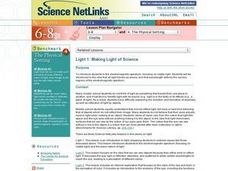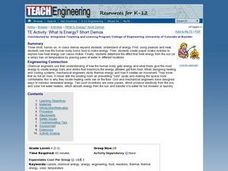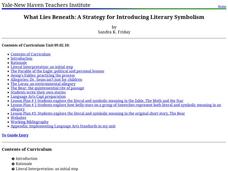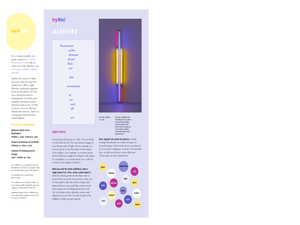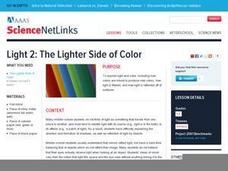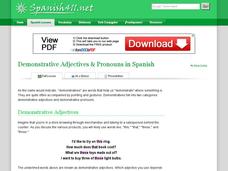PBS
Star Power
Let there be light—or maybe not. Pupils learn about light pollution with an investigation of constellations. They create constellation boxes and experiment with different levels of light. Observations are then made about the lighting in...
Curated OER
Circuit Basics
For this circuits worksheet, students compare voltage, current, and resistance. Students draw a battery with a resistor, switch, and light bulb. This worksheet has 6 short answer, 1 matching, and 6 drawing questions.
Curated OER
Energy Audit
Learners collect data about energy usage and use mathematical calculations to analyze their data. In this energy conservation and statistics math instructional activity, students survey their homes to complete an energy usage worksheet....
Calvin Crest Outdoor School
Survival
Equip young campers with important survival knowledge with a set of engaging lessons. Teammates work together to complete three outdoor activities, which include building a shelter, starting a campfire, and finding directions in the...
NASA
Speaking in Phases
Hear from deep space. Pupils learn how satellites transfer information back to Earth. They learn about three different ways to modulate radio waves and how a satellite sends information with only 0s and 1s. Using sound, class members...
It's About Time
Our Community's Place Among the Stars
But isn't the Milky Way a candy bar? Lead a detailed discussion on the complex topic of our solar system and the Milky Way Galaxy as the class explores stellar evolution, structure, and investigates the relationship between luminosity...
Curated OER
Fun with Circuits
What kinds of things need electricity to work? Kids draw the missing parts to three incomplete circuits in a worksheet about power and electricity. The science exploration asks them to build a circuit to a light bulb, but this might be a...
Curated OER
Making Light of Science
Young scholars investigate the electromagnetic spectrum, focusing on visible light. They are introduced to the idea that all light travels as waves, and that wavelength defines the various regions of the electromagnetic spectrum.
Virginia Department of Education
Metals, Nonmetals, and Metalloids
How can one easily classify metals, nonmetals, and metalloids? Pupils answer this question as they experiment with unknown substances and perform tests on conductivity, brittleness, and malleability to determine which unknown belongs in...
Carnegie Mellon University
How Power Plants Work 2
For this second of three lessons on power plants, future engineers find out how we generate electricity and how coal-powered plants operate. They work in small groups to make electromagnet generators to light LED bulbs. A set of...
Curated OER
Applied Science - Technology (3A) Pre Lab
Third graders discuss electric currents. In this circuit instructional activity, 3rd graders create a picture of a battery circuit and a light bulb. They show the positive and negative charge and the flow of electrons.
Curated OER
Who Will Benefit if We Give Bulbs What They Need to Grow?
Students identify the elements needed for bulbs to grow. They raise tulips and give them to various members of the community. They identify local philanthropic communities and look for ways they can constructively donate time and give...
Curated OER
Cast of characters -- Lost in Space Lesson
Students examine how artists use the picture plane to depict two and three dimensions. They view online images, discuss how space is used to depict three-dimensional space, and create a painting.
Curated OER
Simply Circuitry and Series Circuit
Students investigate a series circuit. In this physical science lesson, students use a battery, switch, and light bulbs to build an electrical circuit. Students identify the standard symbols being used in electric circuitry.
Curated OER
What Is Energy? Short Demos
Students engage in three short, hands-on, in-class demos which expand students' understand of energy. First, using peanuts and heat, students see how the human body burns food to make energy. Then, they create paper snake mobiles to...
Yale University
What Lies Beneath: A Strategy for Introducing Literary Symbolism
“It’s not about what it is, it’s about what it can become.” You’re never too old for Dr. Seuss and using The Sneetches and The Lorax is a great way to introduce readers to allegories, parables, and literary symbolism. The lessons...
Curated OER
Electric Light Art
Students write a poem about a single work of art by Flavin. In this descriptive response lesson, students express their feelings about the work and organize words into phrases. Students arrange word phrases on paper to form the shape...
Curated OER
Heat and Light Come From Various Sources
First graders study heat and light and how they come from various sources. They list sources of heat and light and identify the different energy sources as heat, light, or both heat and light.
Exploratorium
Seeing Your Retina
Using a dimmed flashlight, life science learners can see the network of blood vessels that line the back of their eye. Darken the room and let them try this activity as part of your unit on the eyeball. Also consider some of the other...
Curated OER
TE Activity: Ohm's Law 2
Students study Ohm's Law 2 after completing an activity about Ohm's Law 1. They determine how long it takes to charge a battery. They examine if it is better to use batteries in series or parallel circuits.
Curated OER
All Those Seeing Color, Say Eye!
Students discuss feelings and explore how to recognize how they are feeling. In this exploratory instructional activity students discuss conflict and ways to resolve problems.
Curated OER
The Lighter Side of Color
Young scholars explore light and color, including how colors are mixed to produce new colors, how light is filtered, and how light is reflected off of surfaces. They read materials provided, complete worksheets, and complete hands-on...
Curated OER
Demonstrative Adjectives & Pronouns in Spanish
Encourage mastery of demonstrative adjectives and demonstrative pronouns. Try out the presentation to introduce your class to the concepts and practice with two integrated exercises. The At a Glance tab and Full Lesson tab can be used...
Curated OER
How Do They Work?
Students investigate famous U.S. inventions by utilizing the Internet. In this U.S. history instructional activity, students examine the relationship between great U.S. inventions such as the radio, telephone and light bulb and the...








